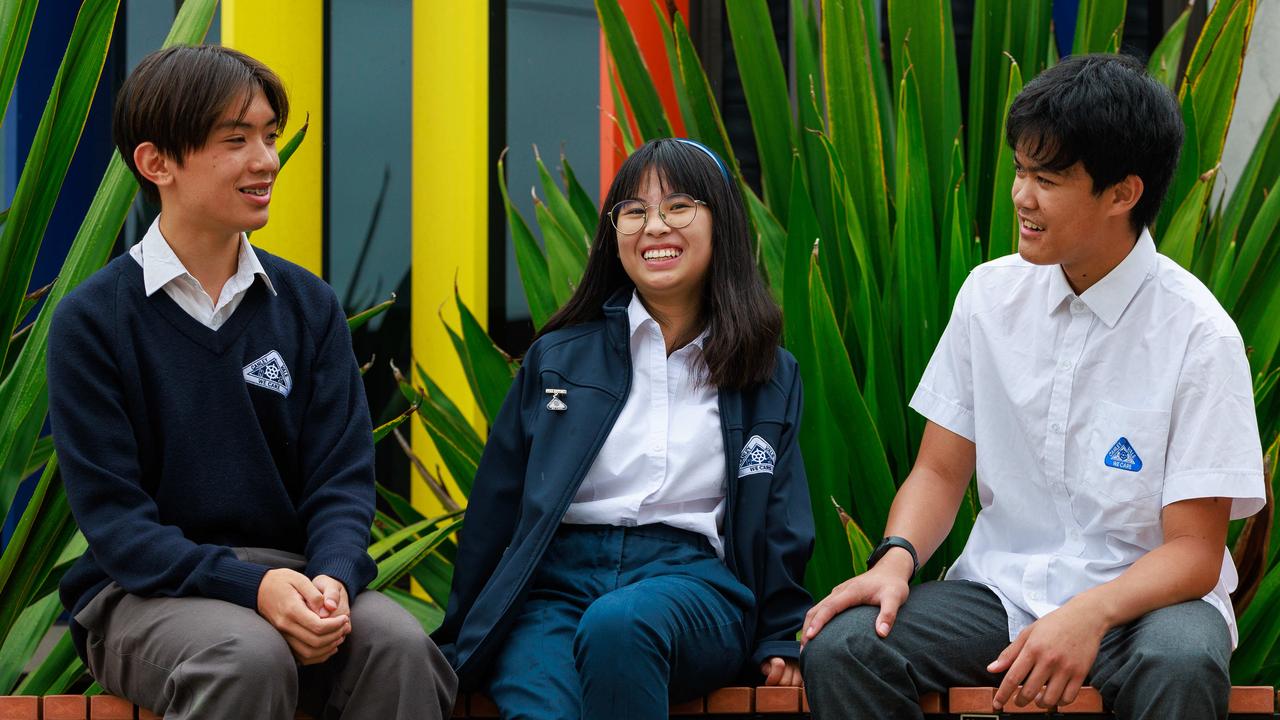NAPLAN results’ five-year average reveals public schools outperforming elite private schools
Five years of NAPLAN data has revealed academic success isn’t just the forte of the state’s elite private schools. See where your child’s school ranks.

Schools Hub
Don't miss out on the headlines from Schools Hub. Followed categories will be added to My News.
Sending your kid to the local public primary school in Western Sydney gives them just as good a chance of setting them up for academic success as spending $30,000 a year on fees for some of Sydney’s ritziest private schools.
When it comes to high schools, while private schools are giving parents more bang for their buck when it comes to delivering academic results, public schools are still the intellectual powerhouse of the state’s school sector.
That’s according to an independent analysis of five years of NAPLAN results which has revealed the schools which consistently performed the best in the Year 5 and Year 9 tests between 2017 and 2021.
To determine how each school performed between 2017 and 2021, their average scores for each year were combined and the yearly average found.
The figures were independently compiled from the Federal Government’s MySchool website, for student performance in reading, writing, spelling, grammar and numeracy.
The best school in the state was Sydney Grammar School in Darlinghurst but there are numerous low-fee schools and public schools that have consistently outperformed elite high fee private schools which are charging primary school parents $30,000.
Sydney Grammar’s students just nudged past other top performing private schools including Abbotsleigh in Wahroonga, which also has outstanding NAPLAN results for primary school students.

Hornsby North is the best public school in the state, a fact which has clearly attracted more parents to the school with its student population ballooning from 837 in 2016 to 980 last year.
Primary school NAPLAN scores at that school are streets ahead of nearby Pymble Ladies’ College where parents fork out upwards of $20,000 to send their kids.
Meanwhile, Woollahra Public School (which has an opportunity class) beat nearby Ascham, Neutral Bay Public beat nearby Loreto Kirribilli, Dural Public nudged ahead of Knox Grammar in Wahroonga while Epping West Public School beat The King’s School in North Parramatta.
In Western Sydney, the popular Carlingford West Public School beat out blue blood schools including Kambala in Rose Bay and Wenona on the north shore.

Meanwhile comparatively low fee schools have also excelled, including Northcross Christian School in Ryde, which charges just $6,796 a year, was ranked 14th in the state.
Principal Catherine Horsburgh said those results were not thanks to hot-housing children with dozens of practice NAPLAN tests but making sure children had a love of reading.
“We don’t do that, that’s not the approach we take,” she said.
“For me it is not about the results, it is about providing an outstanding education for our students.”
Ms Horsburgh said school used explicit instruction when it came to teaching mathematics, where teachers demonstrated a concept and a student would then compete a problem with their peers, followed by the student did a problem on their own.
“We make sure they do not miss out on the foundational skills,” she said.

She also said they had created a very strong culture of reading at the school. And when it came to using laptops in class which has been the craze over the past decade, they were more likely to use an old fashioned pencil and paper.
“I would say we take a more conservative approach to the use of technology while being across all the skills they need to work online in the future,” she said.
“We provide a nurturing environment for the whole child to develop, we partner with the parents.
“We focus on high quality education, we use really robust program called SoundsRight for literacy. We use the explicit instruction model for mathematics.
The top 20 secondary schools were all selective public ones bar Sydney Grammar which was the sixth best high school. As to be expected, James Ruse Agricultural College had the best results, cementing its place as the jewel in the crown of the NSW Public Education system.
High fee elite private girls schools were the next best after the public selectives. The only private boys school to beat them was the comparatively cheap $22,000 a year St Aloysius’ College in Kirribilli beat high fee girls schools like $35,500 a year Abbotsleigh in Wahroonga and $34,080 a year Meriden School in Strathfield.
The most expensive girls school in the whole state, SCEGGS Darlinghurst which charges $42,120 had excellent academic record, as did Ascham in Edgecliff and Queenwood in Mosman.

Tara Anglican School for Girls in North Parramatta came in at 28th, completely outranking its brother school the prestigious King’s which came 42nd.
Oakhill Drive Public School in Castle Hill came in the top 100 primary schools in the state. Principal Betty Ploeg said empowering the teachers to use learning strategies which had been proven to work was behind her school’s success, including explicitly teaching key skills when it came to reading and maths.”
A teacher models a concept and says, ‘watch me, this is how I am going to verbalise how to solve this mathematical problem, and then say, now you do it’,” she said.”
We have fabulous teachers here who embrace learning themselves, who collectively want all of our kids to move into high school as happy, well adjusted, literate and numerate.”
Assistant principal Blane Steel said teachers at the school worked together to share their knowledge about how best to teach specific subjects.”
We’re all part of a team,” he said.
“We learn from each other, we evaluate students’ learning as part of a team rather than just being every man for himself, which works really well in this school.”

The strategy has inspired a love of learning in the students like Evelyn Feng, 8.
“The learning is really, really, fun, we get to laugh all the time,” she said.
Her classmate Alex Savakis, 9, said he liked school because he got to share things he learnt with his friends.
“The teachers always make it so fun so we can enjoy our time at school,” he said.
Joel Ingall, 9, said he liked the hands-on things at school “like testing how fast an ice cube will melt”.
Rose Khamal, 9, said she liked studying a variety of subjects at school.
“I like learning because I get to see my friends and the teachers make it fun, so you enjoy it at the same time and you learn new things at the same time,” she said.



